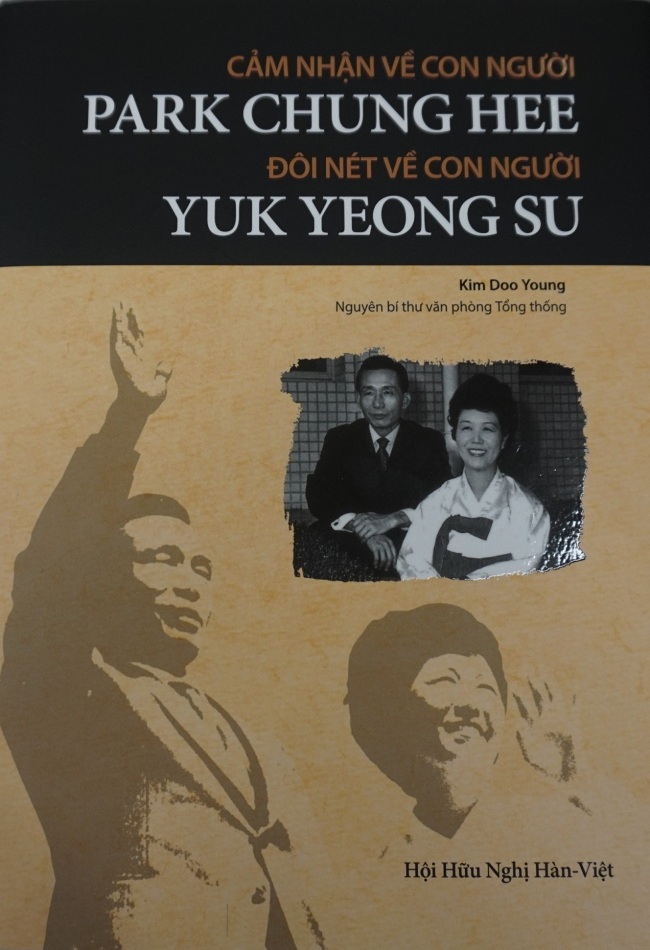A book that chronicles former Korean president Park Chung-hee (1917-1979) and first lady Yuk Young-soo (1925-1974) has been published in Vietnamese.
“Human Park Chung-hee, Human Yuk Young-soo,” written by Kim Doo-young, a Cheong Wa Dae secretary during Park’s tenure, was originally published in Korean last year. Park ― the third president of Korea from 1962 until his assassination in 1979 ― is the father of the current president Park Geun-hye.
Cho Jae-hyun, the vice president of the Korea-Vietnam Friendship Association, translated Kim’s work into Vietnamese to shed light on the president’s personal, lesser-known stories that tie in with the tumultuous history of postwar Korea.
 |
The Vietnamese cover “Human Park Chung-hee, Human Yuk Young-soo” by Kim Doo-young and translated by Cho Jae-hyun. (Cho Jae-hyun) |
Yet, the book is neither a weighty historical narrative nor a research paper, says Cho, 68. “It consists of compelling and interesting accounts of the president.”
When asked what led the veteran professor of Vietnamese language to translate the memoir on the late president ― a military strongman with a mixed legacy ― he said many Vietnamese leaders and politicians he encountered were interested in Park.
Ever since Vietnam initiated economic reforms called Doi Moi in 1986, Vietnamese leaders viewed Korea as a role model for its rapid modernization and democratization, Cho told The Korea Herald.
“For this reason, Vietnamese people are interested in Park, who brought about the country’s rise from postwar poverty.”
However, Cho realized that Park’s humane characteristics were less highlighted among the public: “When people think of the late president, they picture an authoritarian, strict leader.”
“And unlike other books, this one delves into Park’s humble and simple lifestyle through many episodes,” the writer Kim explained.
One of Park’s distinguishing characteristics was that he was a frugal person, the writer shares. The president didn’t allow any kind of air conditioner to be turned on during the hot summer days in the office. Instead, Park opened the window and used a folding fan, or in the worst case, an electric fan. Same goes for winter as he and the employees fought the cold by wearing long johns or drinking hot tea.
A few days after Park passed away, the Cheong Wa Dae staff found two bricks placed inside a toilet tank for the purpose of saving water. “People who witnessed the scene said, ‘The president could have used water freely, and there still would be enough water,’” the author writes.
The book depicts over 40 other compelling stories, such as sending his only son Ji-man to Korea Military Academy, and responding to the needs of citizens upon receiving letters from them.
“President Park had a meticulous personality,” Kim describes. “He focused wholeheartedly on important matters, and let go of trivial matters.”
The second section of the book deals with the first lady Yuk, whom the writer describes as compassionate and humble. She was a messenger between citizens and the president, making sure Park responded to the public sentiments, until her death in 1974 by a bullet meant for her husband. She frequently visited a house for people with Hansen’s disease and helped the needy.
At 289 pages, the book contains over 100 rare photographs of Park and Yuk, which is different from the Korean version. Cho hopes that many Vietnamese people, including the incumbent Vietnamese President Truong Tan Sang, officials, workers and university students, will read the memoir.
“The book will also help in strengthening the bilateral relationship between Korea and Vietnam.”
By Ahn Sung-mi (
sahn@heraldcorp.com)








